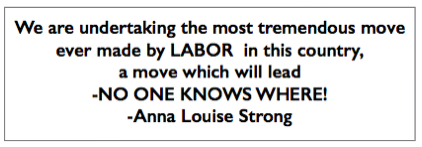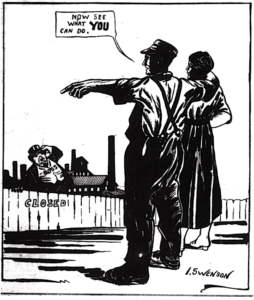 ———-
———-
Hellraisers Journal – Saturday March 29, 1919
The History of the Seattle General Strike: Organization
From The Ohio Socialist of March 26, 1919:
THE SEATTLE GENERAL STRIKE
(HERE IS THE HISTORY OF THE SEATTLE GENERAL STRIKE
AS APPEARED IN THE SEATTLE UNION RECORD)
—–
Four days before the strike actually took place, the meetings of the General Strike Committee began. With their first session on Sunday, Feb. 2, 1919, authority over the strike passed from the Central Labor Council, which had sent out the call, and from the Metal Trades Council which had asked it, and was centered in a committee of over 300 members, elected from 110 local unions and the Central Labor Council, for the express purpose of managing the strike.
The first meeting was called in order at 8:35 in the morning and continued is session until 9:30 that evening, with short intermissions for meals. From this time on until the close of the strike, there were meetings daily and at almost all hours of day and night, of either this General Strike Committee, or of the Executive Committee of fifteen which it delegated some of its authority. The volume of business transacted was tremendous; practically every aspect of the city’s life came before the strike committee for some decision.
A general strike was seen, almost at once, to differ profoundly from any of the particular strikes with which the workers of Seattle were familiar. It was not enough, as some of the hasty enthusiasts declared, to “just walk out.” The strikers were at once brought face to face with the way in which the whole community, including their own families, is inextricably tied together. If life was not to be made unbearable for the strikers themselves, problems of management of selection and exemption had to take the place of the mush simpler problem of keeping everyone out of work.
The strikers had no quarrel with the city of Seattle or with its inhabitants, of whom they themselves and their families comprised perhaps half. They had no particular quarrel with the city government, and most of them took pride in the municipally owned light and water and garbage systems the municipal car line and the public port. While they were doubtless deeply touched by that spirit of unrest and desire for a new world which is sweeping the earth today, they had no definite revolutionary intentions.
Consequently the problems of what should be done about the water supply, the lighting system, the hospitals, the babies’ milk supply, came before a committee of quiet working people whose stake in all these things was as great as that of any persons in the city and who, while they intended to make a tremendous and solid demonstration of sympathy with their brothers in the shipyards, had at the same time no desire to wreck the city’s life.
They realized that they were undertaking something new in the American labor movement; they were not quite certain where it would lead; but they felt themselves strong enough to handle whatever problems might arise.
The Committee Organizes.
To make the problem harder, the General Strike Committee was not, like the Central Labor Council, composed of delegates who had had experience in working together. They were a new group, a very large and unwieldy mass of unacquainted individuals, upon whom, almost at once, great and momentous questions descended.
The quantity of business transacted and the business like attention to many aspects of complicated questions is shown in the minutes of the committee, and indicates a much higher level of efficiency and business like methods than could normally be expected from such a large governing group.
The morning session of the first day was taken up with passing on credentials. Eighty unions, in addition to the 21 unions of the metal trades, presented acceptable credentials at this meeting. A few other unions were added later, making 110 in all.
All unions which had voted to strike, or which belonged to a district council which was striking as a unit, were granted three delegates. A few of the officials of the labor movement were granted seats in the meeting by special vote. Several irregular credentials were turned down.
The first appearance of the inevitable problem of the relation of the strike, to the city authorities occurred when the Garbage Wagon Drivers asked for permission to explain why they had voted against the strike. They stated that Dr. McBride, the health commissioner of Seattle, had told them that they must take care of hospitals and sanitariums, subject to penalty under the law. They had not known whether the strike committee would make any exemption in favor of these emergency needs, and so had voted not to strike. Later the garbage wagon drivers’ delegates were seated and certain exemptions were made in the interests of health.
Another fundamental problem which raised its head in this first meeting was the opposition of officers of international unions. The stereotypers stated that one of their international officers was in the city and would probably try to force them back to work. They wanted to now what support the unions of Seattle could give them in case their international officers supplied men to fill their places and otherwise disciplined them. The committee declared that the sympathetic strike would not be called off until the stereotypers were reinstated in any positions lost as the result of striking.
The date on which the strike should be called came in for much discussion. It was finally decided to fix the following Thursday, Feb. 6, at 10 a. m., and to ask Tacoma to postpone the general strike, which it had ordered until the time agreed on by Seattle.
An executive committee of fifteen was next appointed to work with the metal trades committees in formulating a plan of action, and to present this to the Central Labor Council on the following Wednesday evening. Almost at once other motions made this committee permanent and instructed it to consider all questions of exemption that might arise in the handling of the strike. The decisions of this committee were at all times subject to repeal by the General Strike Committee, but in practice, repeal was not found necessary.
Committees on publicity, on finance and on tactics were also appointed, and many other minor matters of business were disposed of. Among these were the forwarding of a resolution to Washington, D. C., demanding the removal of Mr. Piez of the shipping board, and the adoption of a resolution that no officer or committeeman should receive any salary during the strike.
Jus at the close of the meeting two slogans were suggested. “We have nothing to lose but our chains and a whole world to gain” was rejected in favor of “Together We Win.” The unions of Seattle were declaring in favor of labor’s solidarity; they were not declaring in favor of the well known phrases of the class war.
Executive Committee Organizes.
Even while the first meeting of the General Strike Committee was going on, the newly appointed Executive Committee of Fifteen met and prepared for business. Brother Nauman, of the Hoisting Engineers, was elected chairman, and Brother Egan of the Barbers, secretary. Three sub-committees were appointed to consider exemptions from the general strike order, under three main heads: Construction, Transportation and Provisions.
Committees on miscellaneous exemptions, on grievances and on general welfare were also appointed.
The cooks union reported at this time that their arrangements for feeding the strikers and the public were well under way.
The executive committee decided upon daily meetings. As a matter of fact, so many and so important were the matters brought before them that they found themselves compelled to meet more than once a day.
First Exemption Granted.
On the following day, Monday, the committee of fifteen met again. Before them came a delegation from the Firemen’s Local 27, whom they had requested to appear. After some discussion the committee requested the firemen to stay on the job. This was the first exemption granted in the strike. It was followed by many more.
The transportation sub-committee was instructed to arrange for the necessary forms of permits and signs to designate the autos and trucks used by organized labor in carrying on the necessary activities of the strike. Here again the necessity of exemption was recognized.
C. R. Case, head of the department of streets of the city of Seattle, was the first department head to appear before the committee to state city needs. He pointed out the fact that the water supply of Queen Anne Hill and West Seattle depended on electrical help from the City Light and Power. He also stated that large quantities of food in cold storage would spoil if the power system did not run, and that without the street lights the city would be a prey to lawlessness and disorder and thuggery. He mentioned the needs of gas in hospitals and laboratories, and the need of transportation for the various city institutions.
The committee of fifteen knew what they were facing, if a strike were carried through without exemptions. They appointed a special hour on the following day at which they requested heads of city departments to appear and state their needs, and they expressed as the sense of the committee that they co-operate with these heads in every way possible.
(To be Continued.)
———-
[Photograph and emphasis added.]
~~~~~~~~~~~~~~~~~~~~~~
SOURCES
Quote Anna Louise Strong, NO ONE KNOWS WHERE, SUR p1, Feb 4, 1919
http://depts.washington.edu/labhist2/SURfeb/SUR%202-19-4%20full.pdf
The Ohio Socialist
(Cleveland, Ohio)
“Official Organ of the Socialist Parties of Ohio,
Kentucky, Virginia, West Virginia and New Mexico”
-Mar 26, 1919
https://www.marxists.org/history/usa/pubs/ohio-socialist/061-mar-26-1919.pdf
IMAGE
Seattle General Strike, Now See, SUR p2, Feb 6, 1919
http://depts.washington.edu/labhist2/SURfeb/SUR%202-19-6%20full.pdf
See also:
The Seattle General Strike
“An Account of What Happened in Seattle and Especially
in the Seattle Labor Movement, During the General Strike,
February 6 to 11, 1919″
-Issued by the History Committee
of the General Strike Committee
[Historian, Anna Louise Strong]
The Seattle Union Record Publishing Co. Inc., 1919
https://digitalcollections.lib.washington.edu/digital/collection/pioneerlife/id/9157/rec/1
See esp pages 15-19:
https://digitalcollections.lib.washington.edu/digital/collection/pioneerlife/id/9165
Note: For make-up of History Committee, see:
https://digitalcollections.lib.washington.edu/digital/collection/pioneerlife/id/9158
Tag: Seattle General Strike of 1919
https://weneverforget.org/tag/seattle-general-strike-of-1919/
~~~~~~~~~~~~~~~~~~~~~~~~~~~~~~~~~~~~~~~~~~~~~
There Is Power In A Union – Billy Bragg
“Who comes to speak for the skin and the bone.”

